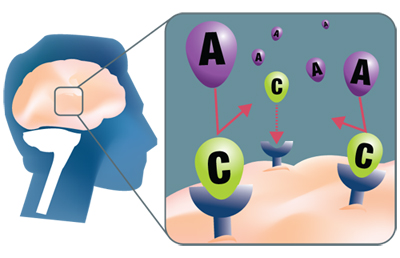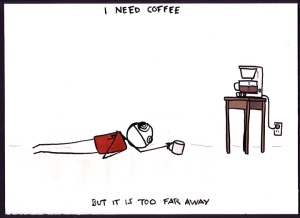I admit it, I am addicted to caffeine. Every morning, like a robot, I wake up and head straight for the Keurig. Well, this morning my alarm went off and instead of getting out of bed I decided that I would lay in bed for 5 more minutes. Ever done that? Um, 5 minutes turned into 30 minutes!! My son came into my room and asked if was a snow day (aka no school). Aaahhhh! I jump out of bed and I have 5 minutes to get him to school on time. Errr, 5 minutes= no time for coffee! Obviously, as a Mom it is more to make sure he was set for the day and not make coffee 🙂 Anyhow, I get him to school and now I’m behind schedule. I head back home wake up my daughter 10 minutes later than usual. Lord have Mercy! this girl takes forever to get ready so, 10 minutes is a big big deal. It amazes me how long it takes her to just come down stairs. Hair is already straight, just needs brushing and she’s too young for make-up…what could she be doing?! I’m so consumed with trying to get her to hurry so she isn’t late that my coffee goes unmade again. It’s just after 9am and I realize I am sooo tired…gotta make that coffee.
Sometimes, I irritate myself. I’ve given up caffeine several times but somehow, I end up having it again. The thing with caffeine is once you have regularly, you need larger quantity to feel it’s effects. You see, we have these receptors on our brain that normally get filled with adenosine which make us tired. Caffeine occupies those receptors blocking adenosine, so you don’t feel tire. Problem is adenosine really wants to occupy a receptor so…we make more receptors! Ahhh, more receptors means we need more caffeine to beat adenosine to all those receptors. It really is a vicious cycle!
Caffeine (C) binds to adenosine receptors in the brain.
That prevents adenosine (A), which is a natural sedative, from attaching itself and making you feel drowsy.
——–
Here’s some information on caffeine…
Caffeine May Help With:
Sleep Deprivation
“Caffeine is definitely beneficial for keeping individuals who are sleep deprived more alert,” says Timothy Roehrs of the Sleep Disorders and Research Center at Henry Ford Hospital in Detroit.
And that’s potentially a lot of people. In a national survey, about 30 percent of the participants reported averaging six hours or less of sleep a night.¹ And in Roehrs’ study of 259 working adults, about 15 percent were so sleepy during the day that they fell asleep within six minutes when they had the opportunity in a sleep lab.²
Why does caffeine help people who are sleep deprived?
Caffeine works mainly by temporarily binding to adenosine receptors in the brain. That prevents adenosine, which is a natural sedative produced by the brain, from occupying those receptors and making us feel drowsy. Adenosine levels build up during waking hours and then drop as we sleep.
“But if you stay up late to watch the World Series and don’t get a full night’s sleep, you’ll wake up with more adenosine in your brain than you normally would,” Roehrs explains. A hit of caffeine will, in effect, neutralize the extra adenosine and help you feel less sleepy.
If you’re a regular caffeine user, though, you may need an extra boost to counter your late night. That’s because regular users build up a tolerance to caffeine.
“As tolerance develops, the brain makes more receptors for adenosine to occupy,” says Roehrs. “So you need more caffeine to block the new added receptors.”
Mental Stimulation
People who don’t use caffeine regularly and who haven’t developed a dependence on it “usually become significantly more alert and better able to perform cognitive and motor tasks—such as paying attention during boring tasks or typing—if they’re given the right dose of caffeine,” says Laura Juliano, a professor of psychology at American University in Washington, D.C.
If they use caffeine regularly, however, it offers few, if any, benefits. For example, in 2005, researchers gave 96 regular caffeine users a battery of tests after two weeks on and two weeks off caffeine. The participants did no better when they were consuming caffeine than when they weren’t.³
“What feels good and stimulating about caffeine to habitual caffeine users is mostly due to the alleviation of withdrawal symptoms,” explains Juliano. In other words, their brains have become dependent on caffeine, so when they haven’t had some for a day or two, they experience unpleasant withdrawal symptoms, like headache, drowsiness, and difficulty concentrating.
If they have a cup of coffee or an energy drink, the symptoms disappear and they feel much better again. “But they’re probably not feeling or performing any better than if they didn’t have a caffeine habit,” notes Juliano.
Physical Performance
“Caffeine can improve physical performance in endurance exercise like running, but the effect is less for short bursts of movement such as lifting weights or sprinting,” says Matthew Ganio, a professor of kinesiology at the University of Arkansas.4
That’s true of people who consume caffeine as well as those who don’t, but the benefit may be smaller in regular users.
Caffeine helps people last longer during exercise because it prompts the body to burn more of its ample stores of fat instead of the limited stores of carbohydrate that are in our muscles. When the muscles run out of carbohydrate, we get tired.
“Caffeine also reduces the perception of muscle pain and the perception of how hard we are working, which makes us feel better when exercising and may help us exercise longer,” adds Ganio.
Headaches
When you have a headache, the blood vessels in your brain often dilate, or widen. Caffeine constricts blood vessels. That’s one reason why caffeine is added to Excedrin, Anacin, and some other headache remedies. Another reason: caffeine is a mild pain reliever.
You can read more about caffeine via Caffeine!.
Even though caffeine is considered addictive it isn’t that difficult to give up. Just gotta get over the fatigue, headaches, and irritability and it’s all good. But for now…





Lol, loved this one! Caffeine is becoming mans best friend 🙂
Definitely a Monday! Today is already headed in the right direction 🙂
I am so thankfull for my low blood presure… what is better than cup of coffee in the morning?
I know, isn’t it wonderful 😀
Ah there’s nothing worse then staying in bed for a little longer and feeling groggy when you finally wake up! Oh, and don’t beat yourself up over having to have coffee- I’ve read some studies that say it’s good for you! 🙂
Pingback: Starry Brain Cells Recognized As Target For Novel Depression Therapy « Life is Mysterious